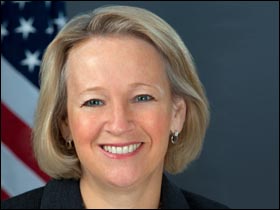Mary L. Shapiro, SEC Chairman , was as plain-spoken and direct as she could be in addressing the 600 plus directors at the National Association of Corporate Directors annual conference, thanking them for inviting her to speak at a time when “so much about what you do — and what I do — is being fundamentally transformed.”
, was as plain-spoken and direct as she could be in addressing the 600 plus directors at the National Association of Corporate Directors annual conference, thanking them for inviting her to speak at a time when “so much about what you do — and what I do — is being fundamentally transformed.”
“Speaking both as a regulator and as a former board member, I believe that it is vital that shareholders and board members move beyond the minimum required communications and become truly engaged in the shared pursuit of high quality governance.
“For boards and their companies, engagement means more than just disclosure. It means clear conversations with investors about how the company is governed — and why and how decisions are made.
“But engagement is a two-way street. Boards can also benefit from access to the ideas and the concerns investors may have. Good communications can build credibility with shareholders and potentially enhance corporate strategies.”
It wasn’t surprising then that the first question during the Q&A asked about running afoul of Regulation FD. As she has said in the past and repeated “Reg FD doesn’t present a barrier to director-shareholder communication. “We have provided additional guidance to directors such as pre-clearing conversations, imposing no-trading restrictions on the shareholders who are talking to directors. In short, Regulation FD is not meant to be a barrier.”
In conclusion she noted that, “Technology, investor attitudes and the way financial markets work have all changed dramatically during the past decade. The way in which we, and in which you and your shareholders communicate, must similarly change.
“The SEC cannot and is not interested in determining the communications strategies of individual companies. But we are interested in breaking down barriers that may prevent effective engagement, and affect investor confidence and, ultimately, financial performance.”
Boards should be developing communication plans now, re-examining their governance documents in light of the changing environment and developing strategies to contribute to improved governance.
 are addressing the press in helping to rebuild the American conversation, their advice has value for all of us.Improving Civic Discourse
are addressing the press in helping to rebuild the American conversation, their advice has value for all of us.Improving Civic Discourse 




